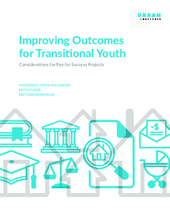Displaying 1041 - 1050 of 2221
This presentation is the result of a critical discourse analysis study which explored the stories–through interviews, observations, and journals–of three young adult women who aged out of the foster care system in a region of Central Tennessee.
This study explores the qualitative responses of child welfare workers in Florida to understand their collaboration experiences, focusing specifically on their perceptions of facilitative factors of collaboration with Intimate partner violence (IPV) services.
"Twenty-nine parents from across Central America who were separated from their children by U.S. immigration agents last year crossed the U.S. border on Saturday, demanding asylum hearings that might allow them to reunite with their children," according to this article from the Washington Post.
This bulletin provides information for child welfare professionals about the importance of permanency for youth and strategies for achieving it. Permanency efforts for youth should include both legal permanency (e.g., reunification, adoption, kinship care) and relational permanency (i.e., a relationship or connection with a caring adult, such as a relative, neighbor, service provider, teacher, or other important person in the youth's life). These adults may provide lifelong support that can help youth transition to adulthood and may even become a legal permanent option for the youth.
This study investigates staff perspectives on a new form of intensive oversight developed in New York State to prevent maltreatment of youth in care facilities.
This brief summarizes insights drawn from Community of Practice conversations and provides recommendations for local governments, service providers, and other partners considering Pay for success (PFS) as a tool for financing interventions serving transitional youth.
New York City's "foster care and juvenile justice system’s 12,000-person workforce, mostly housed at the city’s Administration for Children’s Services (ACS), has begun taking a new course exploring how subtle, unconscious prejudice – often called implicit bias – influences everything from interactions with co-workers to high-stakes child abuse and neglect investigations," according to this article from the Chronicle of Social Change.
This study applies cumulative adversity and stress proliferation theories to examine risk and protective resource profiles of youth with three different levels of housing and parental care instability.
This resource compiles critical data from a variety of sources on children, youth, and families who came in contact with the US child welfare system in federal fiscal year (FY) 2017.
"In each of the past four years, 1,000 or more immigrant children who arrived at the southern U.S. border without their parents have reported being sexually abused while in government custody," says this article from NPR, citing federal records that have recently been released.


